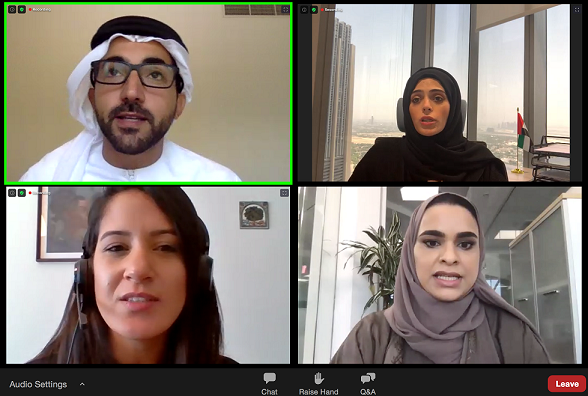Industry Leaders Unravel The Logistical Maze Of Supply Chain Management

Continuing its online entrepreneurial education series, ‘Badiri Knowledge Exchange’, the Badiri Education and Development Academy, the education and capacity building arm of NAMA Women Advancement Establishment (NAMA), convened senior public officials and industry leaders at a virtual panel discussion titled ‘Industry and supply chain for thriving entrepreneurs’ yesterday (Wednesday).
HE Sheikh Fahim Bin Sultan Bin Khalid Al Qasimi, Member of the Executive Council of Sharjah and Executive Chairman of the Department of Government Relations; and Samah Al Hajeri, Chief Innovation Officer and Director of Anti-Injurious Practices in the Ministry of Economy, headlined the discussion, which was moderated by Amal Khatib, Implementation Consultant at Oliver Wyman.
While welcoming the speakers and audience, Dr Mona Al Ali, Manager, Badiri Education and Development Academy, said: “Badiri Academy started this initiative three months ago when the Covid-19 pandemic motivated us to move all our activities online.” She noted that this series has been particularly useful, serving as a platform for scores of entrepreneurs and business owners who have connected, sharing their triumphs, concerns and experiences with each another.
The discussion took off with HE Sheikh Fahim outlining how entrepreneurs can use data analysis in choosing and growing their business. He said: “Before I joined the government, I was an entrepreneur myself. I co-founded a business that was born due to issues with supply chains. Trying to help a friend in the seafood business, I found that the seafood supply chain was inefficient. Finding a certain problem and trying to solve through data analysis led to a successful business idea.We succeeded by building a new specialised B2B supply chain for the seafood business.”
“So, my advice to budding entrepreneurs would be to look for relevant data, which is available from various sources, especially from our government departments. Building a successful business case depends on comprehensive data analysis and application,” he added.
Speaking about how one could leverage technology, Sheikh Fahim said: “Innovation and technology are separate terms. We must ask ourselves: How does technology support the administration of our business? We have to make sure that we are really solving a problem when using technology, because technology is expensive.”
His advice to entrepreneurs hesitating to take the first step was: “Don’t worry. The UAE government has all the data required to support entrepreneurs starting their business. However, on the ground experience is very important. If you want to become a successful entrepreneur, take a risk, quit your job, and go work for someone who has a crazy idea. Working on the ground is the best way to gain experience, and the best way to get over your fear.”
Speaking about the importance of data for entrepreneurs, Samah Al Hajeri said: “It is very important for aspiring entrepreneurs to begin with proper market intelligence. You cannot build a business based on assumptions. In fact, the UAE Government is working on a marketing intelligence tool to support entrepreneurs which will be available soon.”
She added: “Interestingly, we at the ministry have noticed through our interactions with female entrepreneurs that most of them have a strong entrepreneurial spirit. The government too has initiated many programmes such as the accelerator project last year that focuses on empowering women in the economic sector. There is also another policy that we are currently working on to ease the process for the females. The fact that the UAE has 23,000 female entrepreneurs running businesses worth about AED 50 billion is certainly a big achievement and we are working for further growth. However, I must stress that it is not about females or males; we really want to help all entrepreneurs develop their businesses in the UAE.”
Participants were given a short survey at the end of the session to gauge their response to the information they gathered. They also received certificates of participation.
Badiri Knowledge Exchange was launched in April by Badirias a virtual hub for collaborative learning. It has since organised many workshops and panels for entrepreneurs, businesspersons, fresh graduates as well as university students who are interested in upskilling themselves for the future in a world where traditional skillsets alone will not suffice. The events are open to both women and men.
‘The future industries of Sharjah’ on July 15
Continuing the series, Badiri Knowledge Exchange will organise a virtual panel discussion titled ‘The future industries of Sharjah’to enlighten entrepreneurs and aspiring businesspersons as well as business students on the future prospects in the emirate.
HE Marwan bin Jassim Al Sarkal,Executive Chairman of Sharjah Investment and Development Authority (Shurooq) will headline the panel, ably supported by Mohamed Juma Al Musharrkh, CEO of Sharjah FDI Office (Invest in Sharjah); and Husain Al Mahmoudi, CEO of Sharjah Research and Technology Innovation Park. Dr. Abdelsalam Alhammadi will moderate the discussion.
The panellists will present the broader picture of future investment in the emirate; the industries to focus on; the reason why many businesses fail; how to manage crisis situations; FDI trends and how they affect the economy; how FDI is related to entrepreneurship; and how to remain competitive in a dynamic environment.
Benefit from Badiri’s online offerings
Enrolling in an upcoming session is as simple as visiting Badiri’s Instagram account and clicking on the link: https://www.eventbrite.com/e/life-after-covid19-future-jobs-and-skills-tickets-107799465102.Detailed information about the webinars, online workshops and virtual panel discussions are available on Badiri’s social media platforms (@Badiriacademy).

